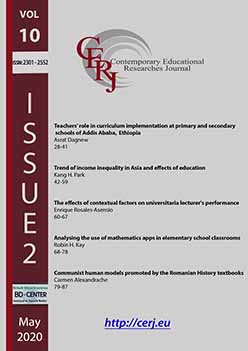Trend of income inequality in Asia and effects of education
Trend of income inequality in Asia and effects of education
Author(s): Kang H. ParkSubject(s): Education, Labor relations, Social differentiation, Globalization
Published by: Birlesik Dunya Yenilik Arastirma ve Yayincilik Merkezi
Keywords: Education inequality; globalisation; income inequality;
Summary/Abstract: This study considers how education and globalisation affect income inequality in Asia, with the unbalanced panel data. The evidence supports the validity of Kuznets inverted-U hypothesis for the connection between the income level and income inequality. However, when more variables are integrated into the model, the consistency of inverse U-shaped curve becomes weaker. The empirical results suggest that educational variables are highly influential in affecting income distribution. Our analysis indicates that a higher level of education achieved by the population aged 15 and over has improved income distribution in Asia,while educational inequality, measured by the educational Gini, has a negative effect on income distribution. Higher levels of globalisation are correlated with higher levels of income inequality, while freedom, either political or economic have marginal effects on the level of inequity in income distribution. Main point; in Asia, a higher level of schooling has contributed to improvement of income distribution, while a larger dispersion of schooling has increased income inequality.
Journal: Contemporary Educational Research Journal
- Issue Year: 10/2020
- Issue No: 2
- Page Range: 42-59
- Page Count: 18
- Language: English

